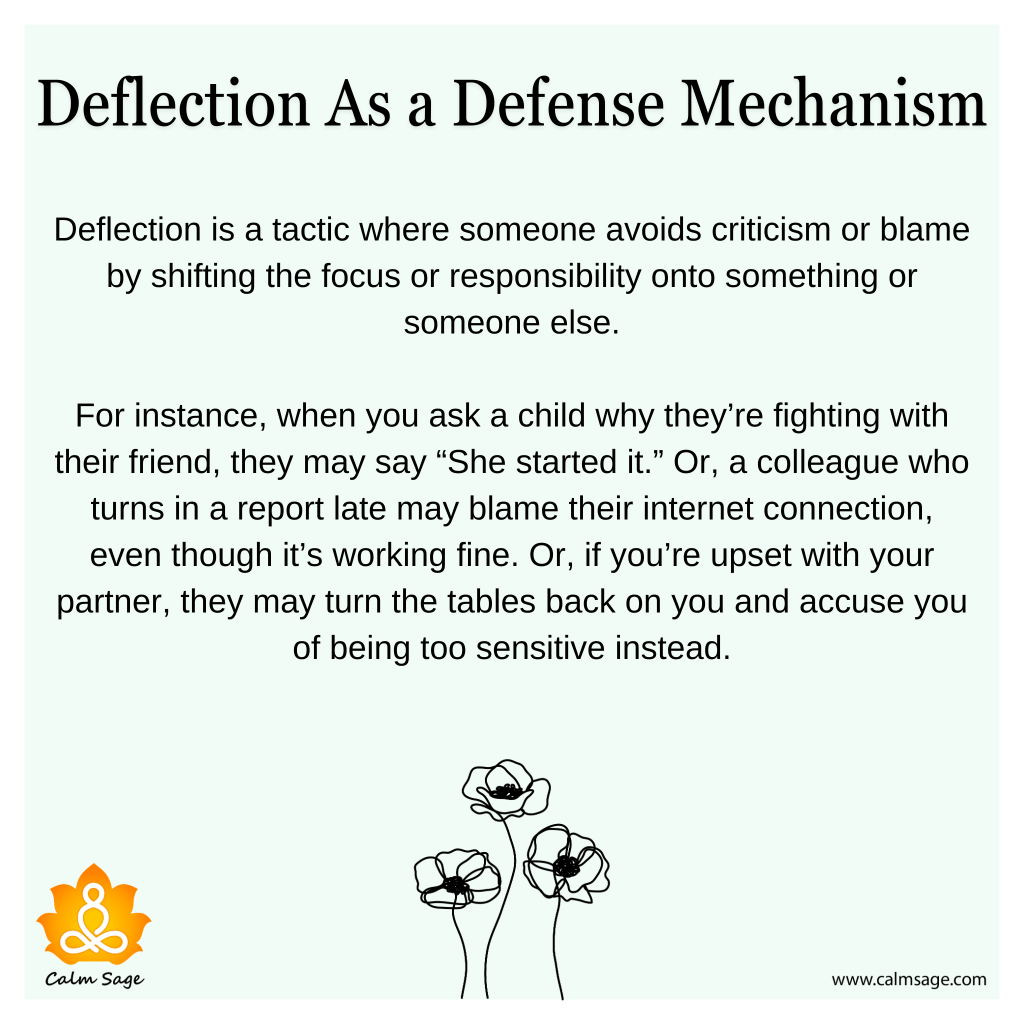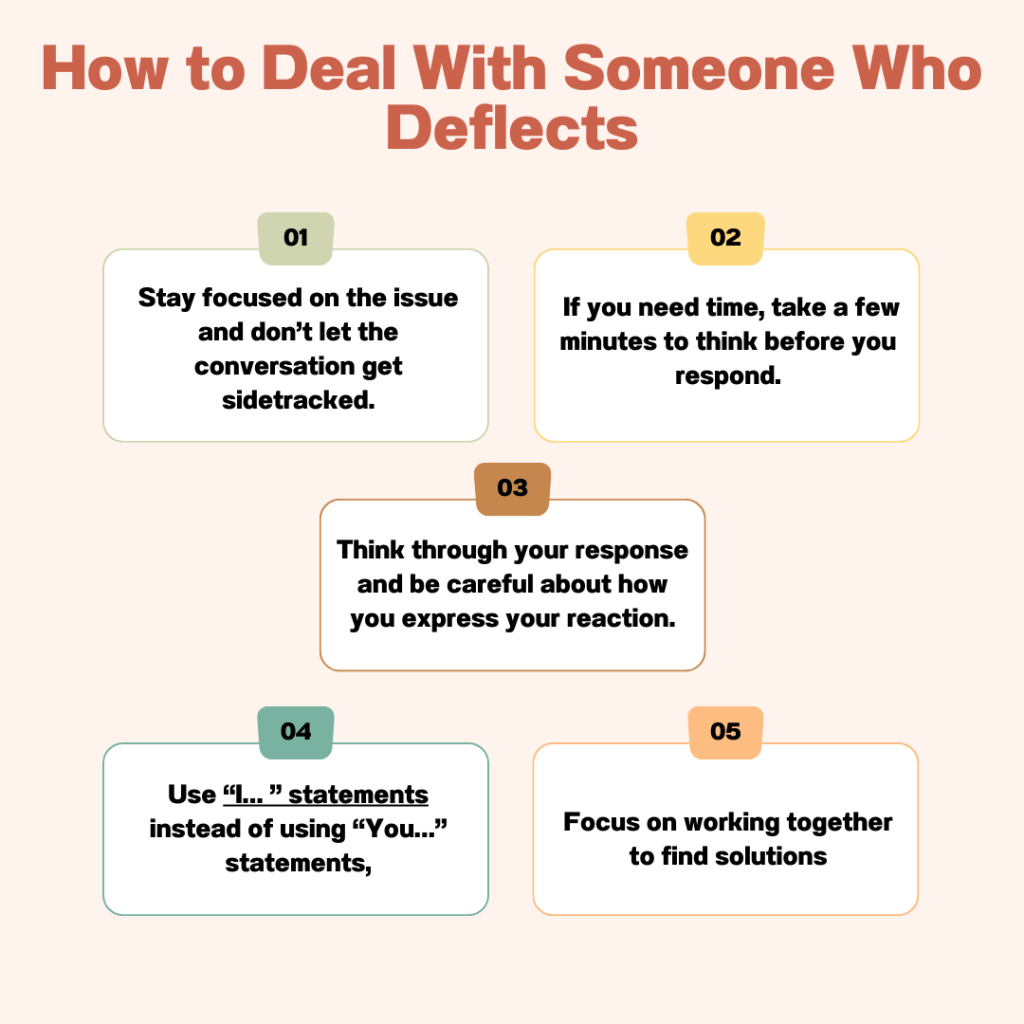The Psychology Behind Deflection As a Defense Mechanism

When it comes to social interactions, we come across different people and their various behaviors. Some behaviors are ingrained in our personality and some we use to mask our vulnerabilities. Some of these behaviors can also serve as a protective shield, deflecting attention away from vulnerability and uncomfortable emotions.
One such defense mechanism that frequently comes up in social and personal interactions is deflection. But what is deflection, exactly? Why do we love deflection as a defense mechanism?
We all crave protection, and we never want the deep truths, the ugly parts of our emotions, to come out for scrutiny by others. Here, deflection helps us avoid criticism by shifting the focus to something or someone else.
Let’s take a look at what deflection is, why we use it as a shield, and what to do when someone uses deflection as a defense mechanism.
What is Deflection?

Deflection is a psychological defense mechanism wherein you redirect conversation or attention away from yourself and onto another topic or someone else. It’s almost like throwing the ball into another’s court for them to dodge. You deflect the focus from something that you find threatening or uncomfortable.
For example; You receive a piece of constructive criticism about your new project. Instead of acknowledging the mistakes and adjustments, you respond by pointing out flaws in your team’s work, shifting the blame or spotlight away from yourself.
Another example in personal relationships could be when you confront your partner about their neglectful behavior, but your partner responds and deflects the blame by bringing up past grievances or unrelated issues, sidestepping accountability for their actions.
Other common examples of deflection as a defense mechanism can include statements such as;
“There’s no need to make a big deal out of this. Can you stop being dramatic?”
“I’ve always been like this. Why can’t you accept me as I am?”
“You did the same thing back then. I didn’t get mad at you then, why are you getting mad at me now?”
“I failed because of the incomplete work XYZ person submitted.”
Why Do We Deflect Blame?
Various studies shed light on the underlying motivations behind deflection. One such study suggests that people prone to deflection as a defense mechanism often have feelings of insecurity or low self-esteem. By deflecting the attention away from themselves, they try to protect their self-image and avoid facing uncomfortable truths about themselves and their behaviors.
Another study conducted by Stanford University suggests that when people experience cognitive dissonance, a state of psychological discomfort from conflicting beliefs, they are more likely to engage in deflection as a means of reducing the discomfort.
Is Deflection Different From Gaslighting?
It’s common to feel confused about this, as deflection does share some similarities with gaslighting. Gaslighting is a manipulative tactic wherein one person undermines the other’s perception of reality. While gaslighting involves intentionally distorting reality or denying facts to manipulate someone’s sense of reality, deflection occurs as a subconscious desire to evade discomfort or shield one’s self-image.
However, in certain situations, deflection can be used as a manipulation tactic instead of a defense mechanism, especially when used to repeatedly avoid accountability for one’s actions or invalidate others’ experiences.
Deflection can also be a type of narcissistic abuse, especially when a narcissist talks back when faced with criticism and negative feedback from others. Even with emotional abuse, deflection can be misused. A person may use deflection as a form of attack instead of facing reality. It goes the other way too in emotional abuse. Sometimes, the victim of the abuse may use deflection to avoid abuse.
Are They Deflecting? Signs to Watch Out For!
Now, when it comes to detecting deflection, you need a keen sense of observation and an understanding of behaviors. Here are some common signs you can watch out for when you need to know if someone is using deflection as a tactic;
- They shift blame onto others or even external factors for problems without acknowledging their role in the problem
- They deflect responsibility and accountability when confronted with their actions or mistakes
- They abruptly change the subject or steer the conversation away from uncomfortable topics
- They downplay the importance of others’ emotions and experiences
- They use humor or sarcasm to deflect serious conversations or criticism
- They make unreasonable excuses for their shortcomings
- They never apologize for their mistakes or deflection if they are called out for it
So, How to Deal When Someone Deflects?
Dealing with deflection comes with patience, empathy, and subtle assertiveness. Here are some effective ways to address deflection in your interactions;

1. Stay Focused: Do not let your attention wander from the issue at hand. If someone tries to deflect, refuse to be derailed by their tactics and remain focused on what is being currently discussed.
2. Be Empathetic: No matter what, acknowledge the other person’s emotions while gently bringing the conversation back to the topic they’ve been deflecting. Empathy can be a great tool in helping the other person stay calm in the face of discomfort.
3. Allow Them to Reflect: Encourage the other person to reflect on their deflection and how it’s impacting them and others around them. You can help them learn the error of their deflection and encourage them to face and express their vulnerabilities in a safe space.
4. Seek Help: In cases where deflection is constant and significantly impairs conversations and relationships, then seeking help from a therapist can be considered. A professional can help you learn effective tools to deal with someone who constantly deflects.
5. Don’t Make it About You: Pause before you respond. Be careful about how you respond to their deflection. Don’t give them a chance to deflect any more than what they have. Instead of allowing them to react to your response, keep it focused on their behavior.
Wrapping Up…
Deflection does act as a psychological protection, shielding you from confronting your vulnerabilities and uncomfortable feelings. While deflection as a defense mechanism might give you temporary relief, constant deflection can hinder meaningful communication and wash away the trust you’ve gained in your relationships.
Knowing the motivations and psychology behind deflection, you can employ effective strategies to deal with someone who deflects.
Remember, addressing deflection requires you to remain patient, empathetic, and honest. So, the next time someone tries to use deflection as a defense, approach it with understanding and patience. Know that beneath the surface there, lies an opportunity for deeper and more meaningful connection.
I hope this blog will help you know when someone is deflecting and how to deal with it when someone uses deflection as a defense. Let us know your thoughts on deflection in the comments below.
Take Care!
Next Read:




















